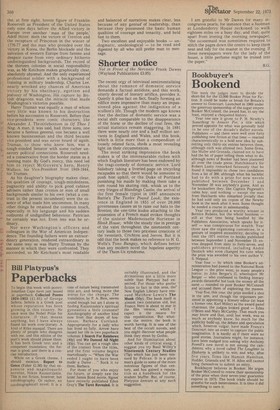Bill Platypus's
Paperbacks
To begin this week with poetry. Jonathan Cape have just issued in paperback Collected Poems 1924-1955 (E1.95) of George Seferis. Seferis is a Greek poet whose reputation has been growing in this country. He once won the Nobel Prize for Literature, if that means anything, but I have always found his work over-literary. A kind of Rilke manqué. There are plenty of people who disagree with me, and this edition of the poet's work should please them. It has both Greek text and a competent translation; the format is good, and there is a concise introduction.
While on a Greek theme, I should mention Report to Greco (Faber £1.50) by that expansive and magniloqueM novelist, Nikos Kazantzakis. This is not fiction, however, but autobiography. Or rather, an autobiOgraphicall novel. It is a case of nature being transmuted into art, and being none the worse for the change. The translation, by P. A. Bien, seems sound enough but am 1 alone in finding Kazantzakis's spiritual gymnastics a little tiresome? Autobiography of another kind now from that doyen of hostesses, Barbara Cartland. Appropriately for a lady who has lived so fully. Arrow have issued her life in two paperback volumes: 1 Search For Rainbows (40p) and We Danced All Night (45p). You can get a rough idea of the content from the titles, and the first volume begins marvellously — "When the War ended I ought to have been, made a Dame ..." Sock it to them, Barbara.
For those of you who enjoy the future, or simply saw the latest James Bond movie, Signet' have recently published Eden Gray's The Tarot Revealed. It is suitably illustrated, and the' divinations are a little more subtle than Platypus had expected. For those who prefer fiction to fact in this area, the' New English Library have reissued Matthew Lewis's The Monk (50p). The book itself is almost two centuries old, but Franco Nero is about to star in the film version, which I expect is the reason for this republication. But whatever the motive, the book is worth having. It is one of the best of the occult novels, and you might discover what people think they mean by Gothic.
And for illumination about other kinds of critical slang, I suggest you try Basil Willey's Nineteenth Century Studies (75p) which has just been reissued by Pelican. It is a plain man's guide to some of the more notorious figures of that century, and has gained a reputation as a handbook for the student bluffer. But, of course,. Platypus demurs at any such suggestion.


































 Previous page
Previous page